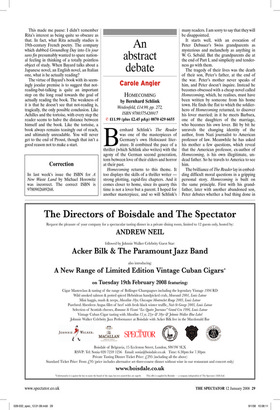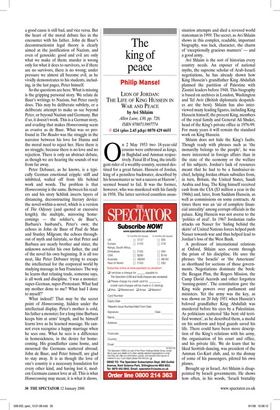An abstract debate
Carole Angier
HOMECOMING by Bernhard Schlink Weidenfeld, £14.99, pp. 272, ISBN 9780375420917 ✆ £11.99 (plus £2.45 p&p) 0870 429 6655 Bernhard Schlink’s The Reader was one of the masterpieces of Germany’s own Holocaust literature. It combined the pace of a thriller (which Schlink also writes) with the agony of the German second generation, torn between love of their elders and horror at their past.
Homecoming returns to this theme. It too displays the skills of a thriller writer — strong plotting, rapid-fire chapters. And it comes closer to home, since its quarry this
e 1
time is not a lover but a parent. I hoped for another masterpiece, and so will Schlink’s many readers. I am sorry to say that they will be disappointed.
It starts well, with an evocation of Peter Debauer’s Swiss grandparents as mysterious and melancholy as anything in W. G. Sebald. But the grandparents die at the end of Part I, and simplicity and tenderness go with them.
The tragedy of their lives was the death of their son, Peter’s father, at the end of the war. Peter’s mother never speaks of him, and Peter doesn’t inquire. Instead he becomes obsessed with a cheap novel called Homecoming, which, he realises, must have been written by someone from his home town. He finds the flat to which the soldierhero of Homecoming returned, to discover his lover married; in it he meets Barbara, one of the daughters of the marriage, who becomes his own lover. Bit by bit he unravels the changing identity of the author, from Nazi journalist to American professor of law. Meanwhile he has asked his mother a few questions, which reveal that the American professor, ex-author of Homecoming, is his own illegitimate, undead father. So he travels to America to see him.
The brilliance of The Reader lay in embedding difficult moral questions in a gripping personal story. Homecoming is built on the same principle. First with his grandfather, later with another abandoned son, Peter debates whether a bad thing done in a good cause is still bad, and vice versa. But the heart of the moral debate lies in the encounter with his father. John de Baur’s deconstructionist legal theory is clearly aimed at the justification of Nazism, and even of genocide: good and evil are only what we make of them; murder is wrong only for what it does to survivors, so if there are no survivors, there is no wrong; under pressure we almost all become evil, as he vividly demonstrates to his students, including, in the last pages, Peter himself.
So the questions are here. What is missing is the gripping personal story. We relate de Baur’s writings to Nazism, but Peter rarely does. This may be deliberate subtlety, or a deliberate attempt to make us see beyond Peter, or beyond Nazism and Germany. But if so, it doesn’t work. This is a German story, and evading that makes Homecoming seem as evasive as de Baur. What was so profound in The Reader was the struggle in the narrator between his love for Hanna and the moral need to reject her. Here there is no struggle, because there is no love and no rejection. There is only an abstract debate, as though we are hearing the sounds of war from far away.
Peter Debauer, as he knows, is a typically German emotional cripple: stiff and inhibited, walled off from life behind work and words. The problem is that Homecoming is the same. Between his readers and his story Schlink inserts layers of distancing, deconstructing literary device: the novel-within-a-novel, which is a version of The Odyssey (and quoted at excessive length); the multiple, mirroring homecomings — the soldier’s, de Baur’s, Barbara’s husband’s, Peter’s own; the echoes in John de Baur of Paul de Man and Stanley Milgram; the echoes throughout of myth and fairytale, so that Peter and Barbara are nearly brother and sister, the unknown novelist his own father, the end of the novel his own beginning. It is all too neat, like Peter Debauer trying to escape the intellectual for the corporeal world by studying massage in San Francisco. The way he learns that relaxing trade, someone says, is all work and discipline. ‘I was a monster: super-German, super-Protestant. What had my mother done to me? What had I done to myself?’ What indeed? That may be the secret point of Homecoming, hidden under the intellectual display. Peter’s mother is cold, his father a monster; for a long time Barbara keeps him at arms’ length, and he himself learns love as he learned massage. He cannot even recognise a happy marriage when he sees one. What he sees is a difference in homesickness, in the desire for homecoming. His grandfather came home, and mourned the Germans scattered abroad; John de Baur, and Peter himself, are glad to stay away. It is as though the love of one’s country is a necessary foundation for every other kind, and having lost it, modern Germans cannot love at all. This is what Homecoming may mean; it is what it shows.



























































 Previous page
Previous page